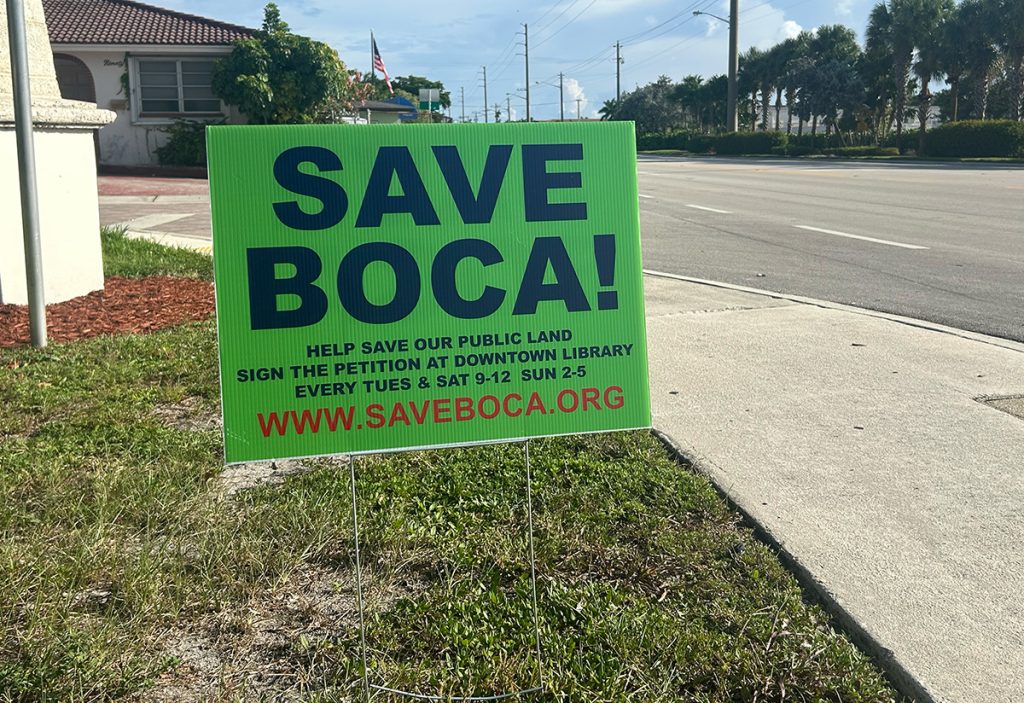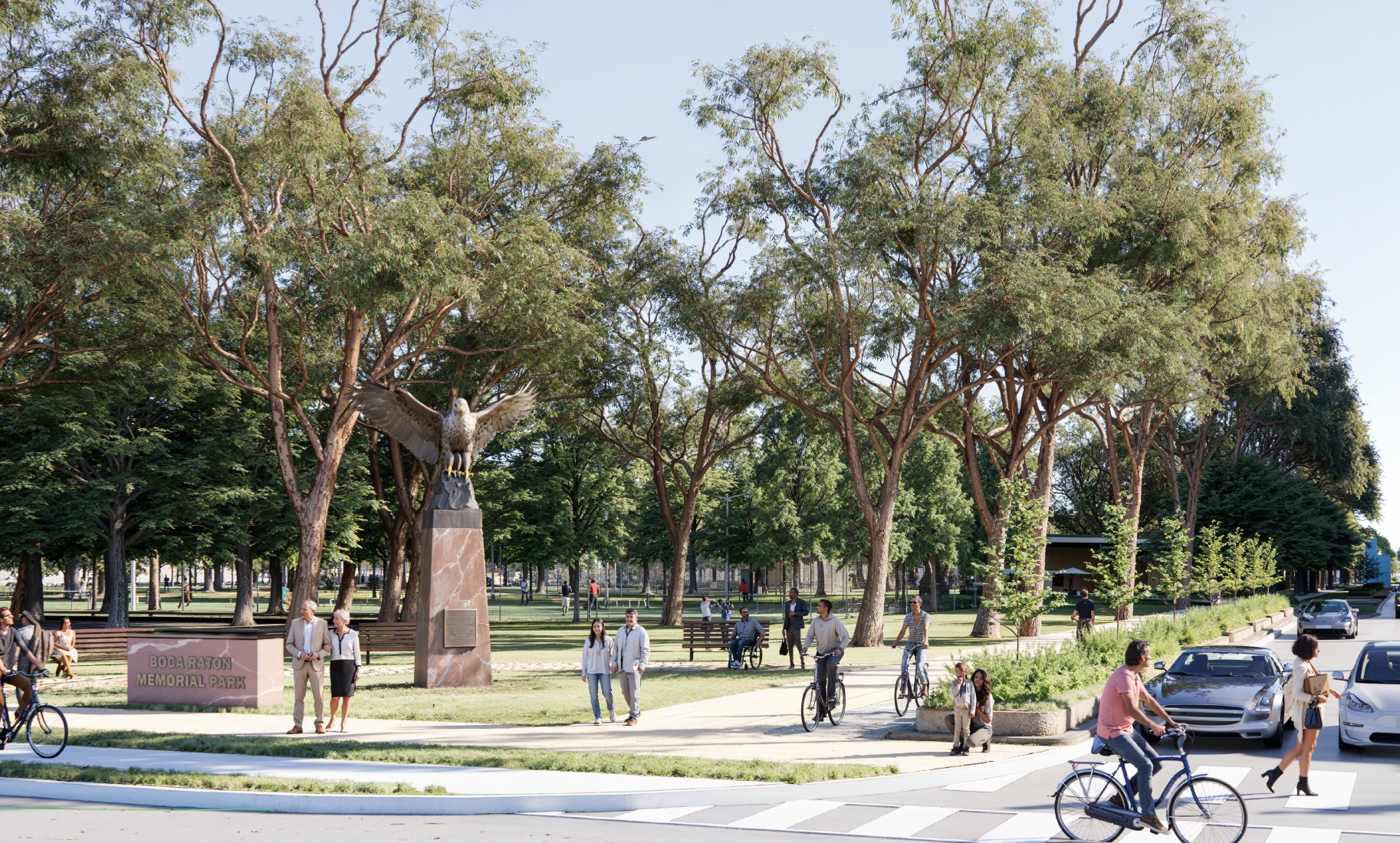Boca Raton faces a deadline regarding Terra/Frisbie’s plan to redevelop the area around City Hall.
On Monday, Terra/Frisbie Principal Rob Frisbie detailed the company’s third version of the plan that first emerged a year ago. Frisbie explained that community meetings prompted the latest changes. Among other things, Terra/Frisbie has eliminated private development west of Second Avenue.
City council members mostly praised the changes. For the first time, during Tuesday’s regular meeting, a few speakers also praised the project—even drawing applause. Opponents wearing Save Boca shirts still vastly outnumbered them, but one speaker asked the council to “save Boca from Save Boca.”
At this point, even diehard opponents can’t credibly accuse Terra/Frisbie of not responding to community feedback. Rather than lease the entire 31 acres of the project area, Terra/Frisbie now would lease only eight acres. The number of apartments is down by nearly one-third from the original proposal. The park space has doubled to 15.4 acres—half the project area.
In addition, Terra/Frisbie proposes formal recognition of Memorial Park honoring veterans—raising that area to a status it currently doesn’t have. Terra/Frisbie proposes keeping a cluster of historic buildings that the city had planned to move. The company has said that it would try to keep a downtown post office if the Mizner Plaza hotel displaces the current facility.
But the council has agreed to hold a public vote on the actual project. That referendum will be in addition to a vote on Save Boca’s charter change that would require a referendum on the “alienation” of more than one-half acre of city land.
The increasingly crowded city election is March 10. To make that date, any ballot proposal from Boca Raton must go to the supervisor of elections office by Dec. 2. To draft language for that proposal, the council and Terra/Frisbie must agree on the main elements of the plan. Then the city must condense those elements into the 75-word limit for ballot items.
City Manager Mark Sohaney acknowledged the deadline when we spoke Wednesday. Sohaney said the council and Terra/Frisbie must “reach consensus on the major elements” of the plan by that deadline. The plan then will continue to be “refined” as the two sides work on a master plan agreement that would go to the council if voters approved the project.
Unfortunately, it does not appear that voters will see a side-by-side comparison of the public costs for the Terra/Frisbie plan and Save Boca’s preferred option of the city going it alone. Sohaney said there are “too many unknowns,” and the city is “not at that point.” Deputy City Manager Andy Lukasik said Tuesday that the city has hired a second consultant to review the financials of Terra/Frisbie’s new proposal.
A spokeswoman said Terra/Frisbie plans “additional opportunities for the public to learn more about the proposal soon.” Fairly soon, though, the public will have to learn what it will be voting on in March.
Save Boca members on the March ballot

Save Boca is running a slate of candidates in the March election.
Mike Liebelson is the slate’s candidate for mayor against council members Fran Nachlas and Andy Thomson. Liebelson regularly speaks against the Terra/Frisbie project. His entrance likely shakes up the race—as the only opponent of the project, Thomson seemingly had been the preferred candidate of Save Boca supporters.
Save Boca founder Jonathan Pearlman is challenging incumbent Marc Wigder in Seat B. Meredith Madsen is the third announced candidate. She is not a member of Save Boca, but Madsen told me after submitting paperwork that she agrees with the group’s opposition to the project.
Michelle Grau is the slate’s candidate in the open Seat A race. Grau also is a regular speaker against the project. Finally, Joe Majhess III is running for the open Seat D against former councilman Robert Weinroth. Like all the Save Boca candidates, Majhess opposes the project in any form. Save Boca Beaches founder Jessica Gray also is running for Seat D.
All four candidates filed Tuesday morning within a few minutes of each other. During Monday’s council workshop meeting, Pearlman indicated that the slate had been formed when he predicted that “new leadership” could be coming.
Pearlman read the same speech during Tuesday’s meeting. Liebelson made a campaign speech by promising to scrap the project and reduce property taxes.
As noted, in addition to the four council races the ballot will include a referendum on the project itself. Voters also will decide whether to approve bonds for a new police station. This likely will be Boca Raton’s busiest election ever and potentially one of its most consequential.
Qualifying runs from Nov. 3 to Nov. 12.
Save Boca’s charter change on the ballot for special election
Even before that March vote, there will be another related to Save Boca and the Terra/Frisbie project.
Council members Tuesday agreed to hold a special election Jan. 13 on the charter change. That date is available because of a special election to fill a vacant Florida House district in northern Palm Beach County. Because none of the district includes Boca Raton, the city likely will have to spend at least $200,000 for the supervisor’s office to staff the polls.
The timing is unfortunate. Turnout will be tiny, especially compared to what the March 10 ballot could bring out. However, the smaller the turnout, the greater the advantage to motivated voters; that would be Save Boca supporters. Any organized opposition will have little time to mount a campaign.
The group collected signatures for two proposals with identical language. In addition to the charter amendment—essentially a change to the city’s constitution—Save Boca got enough signatures for a proposed ordinance—a city rule that a future council could rescind. Ordinance proposals first go to the council, which can reject them, approve them or amend them.
Tuesday’s agenda called for the council to put the ordinance on the ballot without taking one of those actions. Save Boca supporters wanted the council to take that vote. So did Thomson. But he didn’t get a second.
Still, Mayor Scott Singer and councilmembers Wigder and Yvette Drucker made clear that they oppose the language. Wigder referred to it as “the nuclear option” that could force a referendum for even the most noncontroversial transaction.
Wigder used the example of the Fuller Center, which leases city land and to which the city gives money. The cost of a special election to renew that lease, he said, could be more than the city’s donation.
Singer said, “I don’t care for this language,” calling it “a pathway for a lot of litigation.” He and others who spoke with Save Boca said there was “no room for negotiation.” No one at Save Boca has discussed who wrote the language and whether a lawyer was consulted. Almost certainly, though, it will become part of the charter in January.
Information session for new Boca police station
Speaking of the police station, the city will host what a news release calls “an information session to provide background information, details of the proposed project and financing facts to help residents make an informed decision.” It will take place on Monday, Nov. 3, from 6 – 7:30 p.m. at the Spanish River Library.
A Delray Beach charter change would require larger consensus for firing city managers
Speaking of the March election, city commissioners will debate whether to include on Delray Beach’s ballot a charter change that would make it harder to fire the city manager.
Commissioner Rob Long proposed the idea at the end of the Oct. 14 meeting, referring to it as a “housecleaning thing.” In fact, it’s a bit more than that.
In 2014, voters lowered the threshold for firing the manager from four votes to three votes. It happened because two of the five commissioners at the time had refused to fire the manager that year, despite ample reason to do so. An inspector general’s report had found that the manager misled the commission on a trash cart purchase. He also had scheduled a vote on a housing project despite the mayor asking him not to.
His idea, Long said, wouldn’t “block accountability.” It would require a “broader consensus” that would not be affected by an election creating a new majority of three. Long said the higher threshold would ease pressure on the city’s CEO.
Though Long said the proposal “isn’t about protecting current staff,” a week later Commissioner Juli Casale pushed back. She is City Manager Terrence Moore’s biggest critic.
Nevertheless, the consensus in favor prevailed. City Attorney Lynn Gelin said she would present a proposal in time for the required two public hearings before the Dec. 2 deadline for the ballot. Though Long had suggested applying the proposed standard to the city attorney and auditor—the other employees who report to the commission—the ballot item would refer only to the manager.







